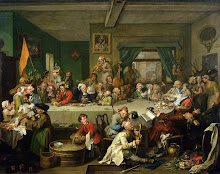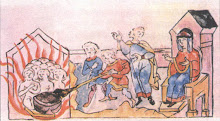"Ah, broken is the golden bowl!
The spirit flown forever!
Let the bell toll! — A saintly soul
Glides down the Stygian river!
And let the burial rite be read —
The funeral song be sung —
A dirge for the most lovely dead
That ever died so young!"
*****
"How shall the ritual, then, be read?
The requiem how be sung
For her most wrong'd of all the dead
That ever died so young?"
Saturday, January 30, 2010
Virginia Clemm Poe: 8/15/1822 - 1/30/1847
Monday, January 25, 2010
The Myth of the Poe/Osgood/Griswold "Triangle"
"The exact contrary of what is generally believed is often the truth"Among the tawdrier writings about Edgar Allan Poe, it has become quite popular to attribute Rufus Griswold's enmity towards him as being largely inspired by jealousy over Frances S. Osgood. It is, like the story that Osgood was estranged from her husband when she knew Poe, one of those fallacies that can't seem to be killed off with an axe. According to this tradition, Griswold and Poe were both suitors for Osgood's favor (never mind that all three were married,) a competition that maddened Griswold to the point where he took a brutal literary revenge against his dead rival. (Left unasked is the question of how to explain Poe's many other, even more vicious calumniators--Thomas Dunn English, Charles F. Briggs, Lewis Gaylord Clark, etc. Are we to believe that they were all motivated by lust for that histrionic little flittermouse Mrs. Osgood and what English so memorably described as her "infantile act?")
-Jean de la Bruyere
 This melodramatic balderdash was, of course, started by that queen of melodramatic balderdash, Sarah Helen Whitman. (In tribute to the extent that she and her ether bottle managed to muddy the waters of Poe biography, I hereby nominate Mrs. Whitman for this blog's prestigious Sallie Robins Memorial Award.**) She is, in fact, the only source for the "jealousy" legend. What planted this idea in her head was a note Griswold wrote his friend Mary Hewitt in the spring of 1850. Hewitt, wishing to clarify Griswold's motives in regard to his infamous Poe memoir, later passed the letter on to Whitman. We do not have this note, but Whitman later quoted Griswold as writing, "I am getting on rapidly with my 'Life of Poe,' and am trying hard to do him justice, for Fanny's spirit looks down on me while I write."
This melodramatic balderdash was, of course, started by that queen of melodramatic balderdash, Sarah Helen Whitman. (In tribute to the extent that she and her ether bottle managed to muddy the waters of Poe biography, I hereby nominate Mrs. Whitman for this blog's prestigious Sallie Robins Memorial Award.**) She is, in fact, the only source for the "jealousy" legend. What planted this idea in her head was a note Griswold wrote his friend Mary Hewitt in the spring of 1850. Hewitt, wishing to clarify Griswold's motives in regard to his infamous Poe memoir, later passed the letter on to Whitman. We do not have this note, but Whitman later quoted Griswold as writing, "I am getting on rapidly with my 'Life of Poe,' and am trying hard to do him justice, for Fanny's spirit looks down on me while I write."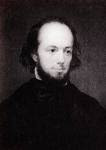
Assuming Griswold actually made such a statement--and it does sound like him at his most sickeningly oleaginous--he and Hewitt obviously saw it as a defense of his insulting memoir. Griswold always piously claimed that he had been kind to Poe's memory, that he did a gentlemanly suppression of all sorts of never-described, but, he implied, unspeakable revelations about the dead poet. (One wonders how Griswold reconciled his ventures into forgery with his claims of "doing Poe justice," but never mind.) Presumably, the letter claimed he was presenting Poe in the best possible terms, out of Griswold's respect for Osgood's admiration for him. (Unless, of course, he knew that cruelly denegrating the dead man was exactly what "Fanny" would have wanted--and with this crowd, that's always a possibility.)
Hewitt obviously assumed this letter would convince Whitman of Griswold's good intentions--certainly, Hewitt would not have wanted to give the idea that her good friend and literary patron Griswold acted from base motives--but unfortunately Sarah Helen, as she so often did, took hold of the wrong end of the stick and allowed her drug-fueled imagination to run riot. She knew--as who did not?--of Osgood's flagrant public admiration for Poe, as well as Griswold's corresponding (and probably equally shallow and insincere) fondness for Osgood. Whitman thus came to the assumption that Poe's literary executor allowed jealousy of Osgood's partiality to lead him into character assassination. Whitman wrote that Griswold's "task" (of doing Poe "justice") "was evidently too great for him. He could not forgive him [Poe] the interest which he had inspired in the person he [Griswold] most wanted to please." In her strange little 1860 book, "Edgar Poe and His Critics," Whitman carried her fantasies even further, with an addled and completely irrelevant passage where viewing portraits of the trio led her to envision Poe and Griswold simultaneously battling for Osgood's praise and affection. (A footnote: Whitman's booklet does make an interesting read, if only as proof of her total and rather sad lack of understanding about Poe--as a man or a writer. Her complete misinterpretation of "Eureka" makes particularly painful reading.)
Her offbeat musings entered their way into Poe lore, despite their tenuous connection to reality. As some of Whitman's own contemporaries noted, it was absurd to picture Poe and Griswold as "rivals" over Osgood. When Poe knew her, Griswold was nowhere on the scene, and by the time she and Griswold became close, Poe was long gone from her life. And as at least one person at the time added, it was well known that Poe's interest in Mrs. Osgood was entirely literary. In addition, everyone who knew Griswold was aware that he had nursed a bitter hatred towards Poe for years before either man even met Osgood. Griswold undoubtedly felt a professional jealousy towards Poe, who was infinitely more talented and far from shy about advertising the fact. There is, however, no evidence whatsoever that he ever saw him as any sort of romantic rival. Even Griswold's friends conceded that he was hyper-sensitive and extraordinarily vindictive--not to mention mentally unstable--and it seems that Poe always had a particular gift for unsettling him. Griswold was, however, too frightened of Poe to openly express this loathing while his enemy lived, making his long-delayed counterattack all the fiercer.
And, in any case, let's be honest: At the time the two men knew her, Frances Osgood was middle-aged (by the female standards of the day,) sickly, unintellectual, childlike rather than seductive or flirtatious in demeanor, a wife and mother, and--as both Poe and her portraits attested--homely. She made a poor choice for the role of femme fatale.
What also works against the idea that Griswold was motivated by jealousy over Osgood is the fact that he did so much to promote the view that she and Poe had been close. Whitman herself quoted his note to Hewitt, where he virtuously portrayed himself as anxious to do Poe "justice" for Osgood's sake. He included her self-aggrandizing Poe reminiscences in his biography. He even concocted a fable where he described Poe, committed to reciting an original poem at the Boston Lyceum and paralyzed by writer's block, as begging Osgood to write a poem "equal to my reputation" that he could pass off as his own work. The best comment on this absurd story came from John H. Ingram, who snorted, "That a poem equal to his reputation could have been composed in a week, or any length of time, by Mrs. Osgood...none knew better to be impossible than Poe." Griswold's collusion with Osgood in publicizing her friendship with Poe hardly indicates any romantic envy.
The popularity of the notion of a Poe/Osgood/Griswold triangle is a perfect example of the fundamental unseriousness of most modern Poe research.
**A Footnote: Sallie Robins was an Ohio woman who shortly before the Civil War, began researching Poe's life for a planned published defense of the poet. Unfortunately, her investigations soon caused her to go hopelessly mad. This is not an uncommon side-effect among Poe biographers.
Thursday, January 21, 2010
That "New" Poe Portrait
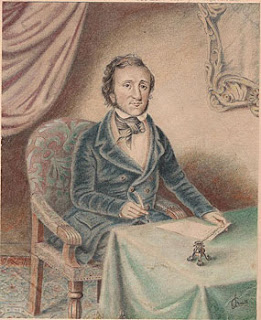 Evidently, this spring Cowan's will be auctioning off that watercolor portrait of Poe that was recently unveiled to the world. I will be--to paraphrase P. G. Wodehouse--watching this painting's future career with great interest. I am curious to discover--and, honestly, I'm not being snide, I genuinely want to know--how they can definitively authenticate a painting that has no known history before 1978. And that looks like it was whipped up by a nine-year-old using a paint-by-numbers kit.
Evidently, this spring Cowan's will be auctioning off that watercolor portrait of Poe that was recently unveiled to the world. I will be--to paraphrase P. G. Wodehouse--watching this painting's future career with great interest. I am curious to discover--and, honestly, I'm not being snide, I genuinely want to know--how they can definitively authenticate a painting that has no known history before 1978. And that looks like it was whipped up by a nine-year-old using a paint-by-numbers kit.OK, there I was being snide.
See you next week, my friends, when I am planning a post that I assure you will be snide beyond all previous imagining. Hope you like it.
Tuesday, January 19, 2010
Poe Toaster, R.I.P.?
I suppose you all have heard that the Poe Toaster failed for the first time to make his annual appearance. This article doesn't give any new information; I was just fascinated to see the story turn up in Pravda, of all places.
As for PT's identity, well, I think Bill Crider may have been on to something.
(The Poe Toaster ain't me, I swear it. I hate Cognac.)
As for PT's identity, well, I think Bill Crider may have been on to something.
(The Poe Toaster ain't me, I swear it. I hate Cognac.)
A Poet's Death Is His Life
The dark wings of night enfolded the city upon which Nature had spread a pure white garment of snow; and men deserted the streets for their houses in search of warmth, while the north wind probed in contemplation of laying waste the gardens. There in the suburb stood an old hut heavily laden with snow and on the verge of falling. In a dark recess of that hovel was a poor bed in which a dying youth was lying, staring at the dim light of his oil lamp, made to flicker by the entering winds. He a man in the spring of life who foresaw fully that the peaceful hour of freeing himself from the clutches of life was fast nearing. He was awaiting Death's visit gratefully, and upon his pale face appeared the dawn of hope; and on his lips a sorrowful smile; and in his eyes forgiveness.
He was a poet perishing from hunger in the city of living rich. He was placed in the earthly world to enliven the heart of man with his beautiful and profound sayings. He was a noble soul, sent by the Goddess of Understanding to soothe and make gentle the human spirit. But alas! He gladly bade the cold earth farewell without receiving a smile from its strange occupants.
He was breathing his last and had no one at his bedside save the oil lamp, his only companion, and some parchments upon which he had inscribed his heart's feeling. As he salvaged the remnants of his withering strength he lifted his hands heavenward; he moved his eyes hopelessly, as if wanting to penetrate the ceiling in order to see the stars from behind the veil clouds.
And he said, "Come, oh beautiful Death; my soul is longing for you. Come close to me and unfasten the irons of life, for I am weary of dragging them. Come, oh sweet Death, and deliver me from my neighbors who looked upon me as a stranger because I interpret to them the language of the angels. Hurry, oh peaceful Death, and carry me from these multitudes who left me in the dark corner of oblivion because I do not bleed the weak as they do. Come, oh gentle Death, and enfold me under your white wings, for my fellowmen are not in want of me. Embrace me, oh Death, full of love and mercy; let your lips touch my lips which never tasted a mother's kiss, not touched a sister's cheeks, not caressed a sweetheart's fingertips. Come and take me, my beloved Death."
Then, at the bedside of the dying poet appeared an angel who possessed a supernatural and divine beauty, holding in her hand a wreath of lilies. She embraced him and closed his eyes so he could see no more, except with the eye of his spirit. She impressed a deep and long and gently withdrawn kiss that left an eternal smile of fulfillment upon his lips. Then the hovel became empty and nothing was left save parchments and papers which the poet had strewn with bitter futility.
Hundreds of years later, when the people of the city arose from the diseased slumber of ignorance and saw the dawn of knowledge, they erected a monument in the most beautiful garden of the city and celebrated a feast every year in honor of that poet, whose writings had freed them. Oh, how cruel is man's ignorance!
-Khalil Gibran
This little fable has been in the back of my mind this whole past Poe Bicentennial year. Happy birthday, Edgar. May 2010 finally be a year when no one publishes lies about you.
Yeah, I know. That'll be the day.
Friday, January 15, 2010
"Instinct vs. Reason--A Black Cat"
"Instinct, so far from being an inferior reason, is perhaps the most exacted intellect of all. It will appear to the true philosopher as the divine mind itself acting immediately upon its creatures."
Edgar Allan Poe's short essay, "Instinct vs. Reason--A Black Cat," appeared in "Alexander's Weekly Messenger" for January 29, 1840. It is one of his more unnoticed and underrated works. This is surprising, as this seemingly innocuous musing about the antics of his pet cat, a "remarkable" animal "of a demure and sanctified demeanor," stands as an important precursor to the ideas he would later flesh out in "Eureka."
Poe begins by noting that such creatures as lion-ants, spiders, and beavers "have in them a wonderful analogy, or rather similarity, to the usual operations of the reason of man--but the instinct of some other creatures has no such analogy--and is referable only to the spirit of the Deity itself, acting directly, and through no corporeal organ, upon the volition of the animal." For instances, the coral-worm skillfully builds ramparts against the sea with not only precision, but with "prophecy," forseeing whatever accidents of nature might cause harm to his dwelling. Bees also build brilliantly engineered cells providing the greatest strength, space, and stability.
Bees and coral-worms act together as if with one mind; and, according to Poe, it is one mind--"the mind of the Creator."
Poe uses the ability of his black cat to open a latched kitchen door, a process requiring several sequential, well-timed actions, as another example of seemingly inexplicable although undeniable reasoning power. Poe obviously believed what Rosicrucians and other mystics before him felt, believed, and knew--that all that exists, every one and every thing that is, is intelligence; that one mind inhabits each sub-atomic particle, and needs only to be accessed to provide a manifestation of "the spirit of the Deity itself." What Poe calls "instinct" is of a higher level than "reason," because the former faculty is a revelation of this collective, universal intelligence, while the latter is merely an earthly, individual endeavor.
The soaring peroration of "Eureka" applies equally well to this essay: "Think that the sense of individual identity will be gradually merged in the general consciousness--that Man, for example, ceasing imperceptibly to feel himself Man, will at length attain that awfully triumphant epoch when he shall recognize his existence as that of Jehovah. In the meantime bear in mind that all is Life--Life--Life within Life--the less within the greater, and all within the Spirit Divine."

Monday, January 11, 2010
Poe In Short Fiction...
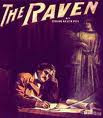 With the exception of Harold Schechter's murder-mystery series, all the many novels I have encountered which feature Edgar Allan Poe as a character have varied between inane, vulgar, bizarre, and simply putrid. (Sometimes all four.) For whatever reasons, he has yet to find a novelist worthy of him. Oddly enough, however, I have come across a few short stories revolving around Poe that I thought were quite good. Even more curiously, they all have a supernatural element. Strangest of all, aside from the Schechter novels, it is only in short stories where you can find fictional portrayals of Poe that depict him not only as sympathetic, but intelligent. Go figure that.
With the exception of Harold Schechter's murder-mystery series, all the many novels I have encountered which feature Edgar Allan Poe as a character have varied between inane, vulgar, bizarre, and simply putrid. (Sometimes all four.) For whatever reasons, he has yet to find a novelist worthy of him. Oddly enough, however, I have come across a few short stories revolving around Poe that I thought were quite good. Even more curiously, they all have a supernatural element. Strangest of all, aside from the Schechter novels, it is only in short stories where you can find fictional portrayals of Poe that depict him not only as sympathetic, but intelligent. Go figure that.I present to you the following:
1. "The Man Who Collected Poe," by Robert Bloch. I have a particular soft spot for this story, as reading it spurred my interest in Poe himself, thus setting me off on this long, strange trip I've been pursuing ever since. Even if you know nothing about Poe, you can still appreciate Bloch's mordant wit, but Poe fans will note the nifty parody of "The Fall of the House of Usher."
2. "But I Feel the Bright Eyes..." by Bill Crider. Poe vs. a vampire cult seeking world domination. Believe me, it's much better than that description might lead you to think. I'm in no position to say what Crider was aiming for in this story, but it can be read as a perfect allegory for Poe's battle with the Transcendentalists and his other literary enemies--a battle that could be said to continue to this day. And Crider's explanation for Poe's death is a lot more plausible than John Evangelist Walsh's.
3. "Castaway," by Edmond Hamilton. Poe discovers that he has a second personality inhabiting his body--an amnesiac time-traveler from an era far into the future, who has been directing and disturbing his subconscious mind.
You have to admit, it would explain a lot.
4. "When It Was Moonlight," by Manly Wade Wellman. Vampires again, with Poe in the Van Helsing role. Wellman (who, incidentally, wrote many marvelous tales of the supernatural,) invests this story with an air of low-key plausibility--just another day in Poe's Philadelphia--that gives his tale a wonderfully quiet effectiveness.
5. "Richmond, Late September, 1849," by Fritz Leiber. Poe finally meets Death in person--who is, of course, a beautiful woman. A subtle, ethereal story, like all of Leiber's best work.
6. "A Revenant," by Walter de la Mare. Poe's spirit listens to a modern-day lecture about himself, and, well, he's not too pleased with it. It's nice to picture Poe finally having the last word. After reading this story, I found myself daydreaming about Poe confronting all these recent biographers and novelists who seem so eager to insult and degrade him: Kenneth Silverman, John Evangelist Walsh, John May, Stephen Marlowe, Joel Rose...
7. "No Spot of Ground," by Walter Jon Williams. You thought Poe met a miserable and obscure end in 1849? Actually, he was rescued from the streets of Baltimore by a benevolent widow, and went on to become a Confederate General. This is one of the odder works of "what-if" historical fiction I've encountered, but it is a quiet, understated story that winds up being surprisingly moving.
8. "The Exiles," by Ray Bradbury. A wonderfully haunting tribute, done in Bradbury's typically evocative style. The ghosts of Poe, Ambrose Bierce, Dickens, Shakespeare, and other literary giants have fled to Mars, as their works have, on Earth, been outlawed as "superstition." Once their writings disappear completely, so will their spirits. The power of words, indeed.
Monday, January 4, 2010
Poe and Thomas Dunn English
 It is well-known among students of Edgar Allan Poe that he and Thomas Dunn English became the most bitter of enemies in 1846, a feud which culminated in Poe's successful lawsuit against the newspaper which published English's libels against him. The ostensible initial cause of their dispute was English's accusation that Poe lied when he said Elizabeth Ellet had written him some sort of incriminating letters. (I would very much like to know why English so involved himself in an issue where he could not have had any personal knowledge, and which was none of his business to boot. It suggests some sort of sinister alliance between him and Ellet.)
It is well-known among students of Edgar Allan Poe that he and Thomas Dunn English became the most bitter of enemies in 1846, a feud which culminated in Poe's successful lawsuit against the newspaper which published English's libels against him. The ostensible initial cause of their dispute was English's accusation that Poe lied when he said Elizabeth Ellet had written him some sort of incriminating letters. (I would very much like to know why English so involved himself in an issue where he could not have had any personal knowledge, and which was none of his business to boot. It suggests some sort of sinister alliance between him and Ellet.)What is less well understood is that Poe and English had been at odds since at least the early 1840s. It has been suggested that during Poe's disastrous visit to Washington D.C. in 1843, he managed to offend the proud and touchy English. English, in turn, may have tried to use his political connections to help sabotage Poe's efforts to obtain a minor governmental appointment. English's enmity did not stop there. Many years later, his business partner, Thomas H. Lane, recalled how English always "had the capacity of being a perfect irritant" to Poe.
In 1843, English published a pro-temperance novel, "The Doom of the Drinkers," which featured a character named "Walter Woolfe." He described Woolfe as a brilliant writer, but also a drunk who "was the very incarnation of treachery and falsehood." The character was intended as a cruel Poe caricature. The following year, English published--under Poe's name--"The Ghost of a Grey Tadpole," a crudely obvious parody of Poe's Gothic prose style. For his part, Poe, in an 1844 letter, contemptuously dismissed English as "a bullet-headed and malicious villain." (This excellent character summation was, however, eclipsed by Poe's later description of his antagonist as "the animalcula with moustaches for antenna.") Anne Clarke, the daughter of Poe's friend Thomas C. Clarke, recalled that during the time Poe lived in Philadelphia, he and his fellow poet Henry Hirst were on such bad terms with English that on one occasion when all three men called simultaneously at the Clarke residence, they had to be escorted to separate sections of the house "lest they come to deadly strife."
Clearly, the two men were never soul mates. The curious thing is that in 1896, when English published his "Reminiscences of Poe," he was careful to hide this fact. He depicted Poe as a drunken, deceitful jerk (who, English suggested, was virtually run out of Philadelphia in 1844 for reasons left unsaid because--he slyly suggested--they were far too scandalous for a gentleman such as himself to reveal. This claim, incidentally, is evidently as false as the rest of English's testimony.) Contradictorily, however, he also described himself as a near-constant companion and confidante of this disreputable creature. If you believe English, he was the chief advisor to the entire Poe household. Poe went to him for help (or "kindness and counsel," in the immortal words of Frances S. Osgood) when he was accused of forgery. Poe went to him for help when he could not come up with an original poem for a recital. Poe went to him for help when the "Broadway Journal" hit the skids. Poe went to him for help when Elizabeth Ellet's brother went gunning for him.
In these "Reminiscences," English gave a distorted version of the Ellet/Osgood letters scandal that first appeared in John Ingram's 1880 biography. (It is notable that English, in all of his previous published accounts of Poe, never said a word about him and Mrs. Osgood until after Ingram's book came out, inspiring English with the need to put his own spin on the Poe/Ellet/Osgood fracas that Ingram publicized.) In English's retelling of the story, Ellet is whitewashed to look as an innocent victim of Poe's insults, with only Osgood--whom English had strongly disliked--and Poe depicted in a negative manner. He is also, interestingly, careful to avoid any mention of any letter written by Osgood as figuring in the dispute--which just bolsters the belief that the "Osgood letter" which instigated the scandal was not a love note, but a tell-all to the Poes dishing the dirt on her enemy Ellet. Just to add that final touch of deceitful sleaze to his report, he claimed that Mrs. Clemm went to him, their dear family friend and councilor, about concerns Virginia had about Poe's friendship with Mrs. Osgood. English claimed that as he had "more influence" with Poe than anyone else in the world, Mrs. Clemm wished him to talk to Edgar about the matter. English said he soothingly assured her Poe and Osgood's relationship was entirely platonic. (Why the ladies Clemm did not go to Poe himself with these alleged worries is not explained.) If his tales--which, let us keep in mind, were published over fifty years after the events in question--are to be believed, no one in the Poe family was capable of so much as buying a pair of shoes without the advice and support of Thomas Dunn English. (Poe specialist Benjamin F. Fisher once neatly summarized English's recollections as "back-stabbing reminiscences which long sustained the guise of plausible biographical information." Indeed, English's own prefatory remarks to these "reminiscences" acknowledge they were written to counter the negative way in which he himself was described in recent Poe biographies by John Ingram and George Woodberry.)
Everything English said was, of course, all rot. It is assumed that for most of 1845, Poe and English had, for reasons of mutual self-interest, maintained a relatively quiet relationship. (Although even that presumption hardly squares with Thomas Lane's memories of Poe storming into their offices during this period announcing "Where is English? I want to kill him.") However, the notion that Poe--or anyone in his family--could have seen the bullet-headed villain who had lampooned him as any sort of confidante is simply impossible. English's efforts to suggest they ever had a close relationship were intended to lend plausibility and objectivity to his assaults on Poe's character (he was saying, in effect, "look, I was such close friends with the guy, you can trust every rotten thing I say about him.") Instead, this fundamental falsehood robs everything he wrote of the slightest credibility. Another reason to ignore English's statements is the oft-ignored fact that, as a result of Poe's libel suit, a New York City courthouse officially ruled that he was an unmitigated liar. Even more: English's later publication, the "John-Donkey," lasted less than a year before collapsing under the weight of the multiple libel suits brought against the publication. The man hardly made an ideal character witness.
English's "Reminiscences" is yet another part of Poe lore that, in a saner world, the poet's biographers would have thrown straight to the dogs.
Subscribe to:
Posts (Atom)


